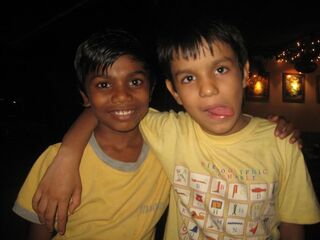Friends
Is Your Child a Good Friend?
Four keys to healthy friendships for children.
Posted September 30, 2020 Reviewed by Ekua Hagan

It’s common to hear kids complain about their friends. The eyes point outward, so it’s easy to see what other people do wrong. Kids are quick to notice when a friend is annoying, disloyal, or mean, but it’s much harder for them to see their own role in creating what’s right or wrong in a friendship.
Here are some of the key aspects of being a good friend, and some corresponding questions that your child might want to consider. These questions aren’t a quiz that kids can pass or fail. They’re really just areas to ponder and perhaps try to improve.
Being a good friend takes effort and practice. It’s not always easy but trying to be a good friend makes it more likely that others will respond in friendly ways.
Fun
For children, especially, having fun together is a central feature of friendship. Kids make and maintain friendships by doing fun things together. Also, kids want to be around kids who are happy and having fun.
- How often do you invite your friend(s) to do fun things with you?
- Would you say that you’re good at coming up with ideas of fun things to do together?
- How open are you to doing things that a friend wants to do (even if it’s not what you want to do)?
- Would your friend(s) say that you’re usually cheerful when you’re together?
- How do you generally respond if you lose a game with a friend?
Support
The give and take of practical support is another crucial aspect of friendship.
- How good are you at sharing and taking turns with your friend(s)?
- If your friend is upset about something, how do you usually respond?
- What have you done to help your friend(s)?
- Have you ever seen someone be mean to a friend? What did you do?
- Have you ever heard someone say something mean about your friend when your friend wasn’t there? How did you respond?
- How good are you at keeping your promises to friends?
Intimacy
We all want to feel that our friends know and value us. As children get older, confiding in each other becomes more important to friendship. But good friends make room for their friends to have other friends.
- To what extent do you tell your friend(s) about what you're thinking or feeling?
- Would your friend(s) describe you as a good listener? Why or why not?
- Do your friends often talk to you about private things?
- If a friend tells you a secret, are you able to keep it confidential?
- What kind things do you do to make your friend(s) feel special?
- How accepting are you of your friends having other friends (besides you)? How do you treat their other friends?
Conflict resolution
Everyone makes mistakes. All friends sometimes disagree. How children handle conflicts can determine whether a friendship lasts.
- If you and a friend have a disagreement, are you most likely to insist, give in, compromise, or storm off?
- If you feel mad or hurt by something your friend does, how do you usually handle it?
- Are you able to stop doing something when your friend asks you to stop?
- What would you do if your friend was upset by something you said or did?
- How are you about letting go of past problems and forgiving your friend for not being perfect?
Related posts
- Helping Lonely Children During the Coronavirus Pandemic
- When Your Child's Best Friend Is "Stolen"
- When You Don’t Like Your Child’s Friend
©2020 Eileen Kennedy-Moore, Ph.D.


